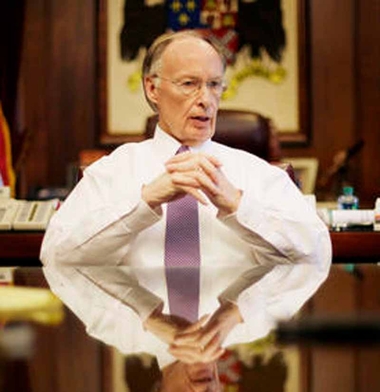Anti-LGBT slurs dragged into Alabama lottery debate

Montgomery, Ala. (AP) — Gov. Robert Bentley's lottery bill headed to a critical vote Thursday night in the Alabama House of Representatives as the Republican governor tries to break through opposition to gambling as a revenue source in the Deep South state.
Alabama would become the 45th state with a lottery if lawmakers and voters approve the idea. The governor is proposing a lottery as a way to get money to the state's perpetually cash-strapped Medicaid program.
"Let our citizens have the opportunity to vote, yes or no, whether or not they want a lottery," said Rep. Alan Harper, R-Tuscaloosa, at the start of debate Thursday morning.
Legislators worked late into the evening during a contentious debate peppered with arguments about the impact on the poor, the best way to use lottery proceeds and if the bill could — or should — also allow electronic gambling machines.
Supporters said Alabama is bordered on three sides by lottery states and is getting no benefit from the tickets Alabamians travel across state lines every day to buy.
"I can tell you for a fact that thousands — and I'm talking about thousands of people up in my area — go over to Tennessee and they buy tickets," said Rep. Kerry Rich, R-Albertville.
Opponents argued that lotteries have failed to solve budget shortfalls in other states while preying upon poor residents' hopes of striking it rich with a winning ticket.
"They don't market them in Mountain Brook. They market them in lower income communities," said Rep. Rich Wingo, R-Tuscaloosa.
Lawmakers voted down an attempt to limit the lottery to only paper tickets after some legislators said they were concerned the bill as written could allow electronic lottery terminals, which resemble slot machines. House members also voted down an attempt to authorize casino gambling and steer a larger chunk of lottery proceeds to education.
The lottery bill needs 63 votes to clear the 105-seat House. Legislators were offering few predictions Thursday other than that the eventual vote would be close.
Harper, who is shepherding Bentley's bill in the House, could be heard at one point on the legislative microphone asking a staffer what the vote count was.
Senators approved the bill last week without a vote to spare and will have to vote again on House changes. The governor projected a lottery would raise $225 million each year, but some lawmakers questioned those projections.
The bill would steer 10 percent of proceeds to education and 90 percent to the general fund budget, with the first $100 million specifically going to the Alabama Medicaid Agency. Lawmakers added an amendment to steer 1 percent of the general fund money to rural fire departments.
Tensions were high over some of the tactics as the House began debate.
Lawmakers came into the chamber and found blue pamphlets on their desks titled "Alabama's Fall?" — which appeared to include an anti-gay reference regarding "perverted lifestyles"— saying Alabama risked losing "God's blessing." Patricia Todd, the state's only openly gay lawmaker, filed a complaint with the House clerk over the violation of House rules regarding anonymous distribution, and the materials were taken up.
The front desk of the House was jammed with telephone calls after Bentley gave out his Capitol office phone number and urged people to get in touch with their legislator.
The debate even found its way into the day's opening prayer as Rep. Thomas Jackson, D-Thomasville, said outsiders were trying to block a vote on a lottery. "God is watching and Jesus knows the evil that is going on in your heart, and there is no escape if you deny the least of these the opportunity," Jackson said.
Supporters were aiming to get the measure on the Nov. 8 ballot. Secretary of State John Merrill said the deadline had passed, but lawmakers argued they have until Friday to pass the bill. Attorney General Luther Strange, in an opinion issued Thursday, said the secretary of state could insist on the Wednesday deadline but had the discretion to add it to the ballot.
"Not unless the law changes," Merrill said.
By Kim Chandler, Associated Press. Copyright 2016 The Associated Press. All rights reserved. This material may not be published, broadcast, rewritten or redistributed.
The Gayly – August 26, 2016 @ 7:30 a.m.





